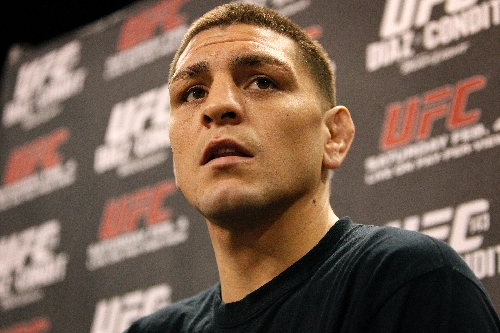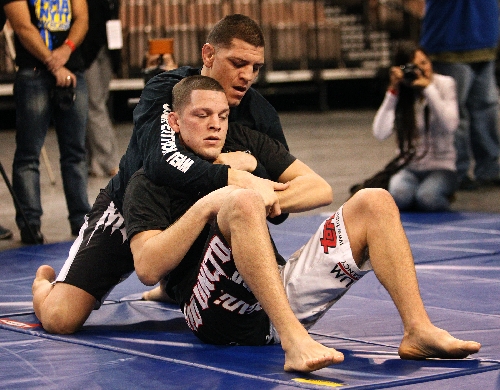Attorney for UFC standout Diaz says fighter shouldn’t face discipline
While Ultimate Fighting Championship star Nick Diaz has not fully committed to returning to the cage, he appears set to do battle in front of the Nevada Athletic Commission.
An attorney for Diaz has filed a response to the NAC's complaint seeking disciplinary action against the fighter. The complaint was put in motion when a postfight urine test -- submitted after Diaz lost a UFC interim welterweight title bout to Carlos Condit on Feb. 4 at Mandalay Bay -- indicated the presence of marijuana metabolites.
In the response filed Wednesday by Diaz's Las Vegas-based attorney, Ross Goodman, an argument is put forth that marijuana is only prohibited "in competition" by the World Anti-Doping Agency, and thus the NAC, which adopted WADA's standards. A test revealing the presence of marijuana metabolites therefore would not be cause for discipline.
Marijuana metabolites are produced as the body tries to break down the drug's presence in the body -- basically, the inactive residual effect of marijuana use. The presence of metabolites shows a person has used the drug, but not necessarily that they were under the influence at the time of the test.
While marijuana users only experience the effects of the drug for a few hours, the metabolites can be present for weeks or even months.
Whether Diaz uses marijuana is not in dispute. He is a licensed medical marijuana user with a valid prescription in his home state of California to treat Attention Deficit Hyperactivity Disorder. The response explains his common practice is to discontinue use of the drug eight days before a fight and that this fight was no different.
The question becomes whether the presence of marijuana metabolites is expressly banned under Nevada law.
Goodman says no. The documents filed with the commission state WADA only prohibits marijuana use "in competition."
Essentially, he would argue in this case that would simply mean a fighter can't be high in the cage.
"Prohibited substances" are also banned, but Goodman points to a Nevada law that explicitly exempts "marijuana or marijuana metabolite" from the list of banned substances for those with a valid prescription.
"Granted, it's in the context of a driving under the influence law, but it specifically defines what should be considered a prohibited substance, and it makes a specific exception for medical marijuana patients," Goodman said.
The attorney said the issue of legal marijuana hasn't been brought up before.
"They have to address that you have somebody that has a medical marijuana card that Nevada in 2009 has recognized as not only being legal, but now remove it from the prohibited list, so how do you have that as a basis for sanctions?" Goodman said. "Show me a rule where marijuana metabolites is a prohibited substance. You're not going to find that. In fact, it has been removed from being a prohibited substance.
"It would be a much better issue for them had he actually tested positive for marijuana."
The appeal makes it likely Diaz will not follow through on his announcement he would not fight again after being disappointed by the judging in the decision loss to Condit. It looked as though Diaz would be granted a rematch with Condit by the UFC until the results of the test were announced.
NAC executive director Keith Kizer said it is possible Diaz's appeal will be on the agenda for the commission's next meeting March 27. If not, the commission will meet again in April.
Deputy attorney general Christopher Eccles will present the state's case against Diaz in front of the commission.
"Nick has the right to bring up whatever defense he wants, and the commission will deal with it at that time," Kizer said.
One potential snag in Diaz's appeal process could be a prefight questionnaire for the commission on which he answered "no" as to whether he had used any prescription medications.
Goodman said he was not advising Diaz at the time and wasn't sure of the fighter's thought process when he filled out the paperwork, but that his failure to disclose doesn't change the crux of the argument.
Diaz was previously suspended for six months and fined 20 percent of his purse by the NAC for a failed marijuana test after a 2007 fight. He probably would face harsher discipline for a second offense if his appeal is unsuccessful.
Contact reporter Adam Hill at ahill@reviewjournal.com or 702-224-5509.























